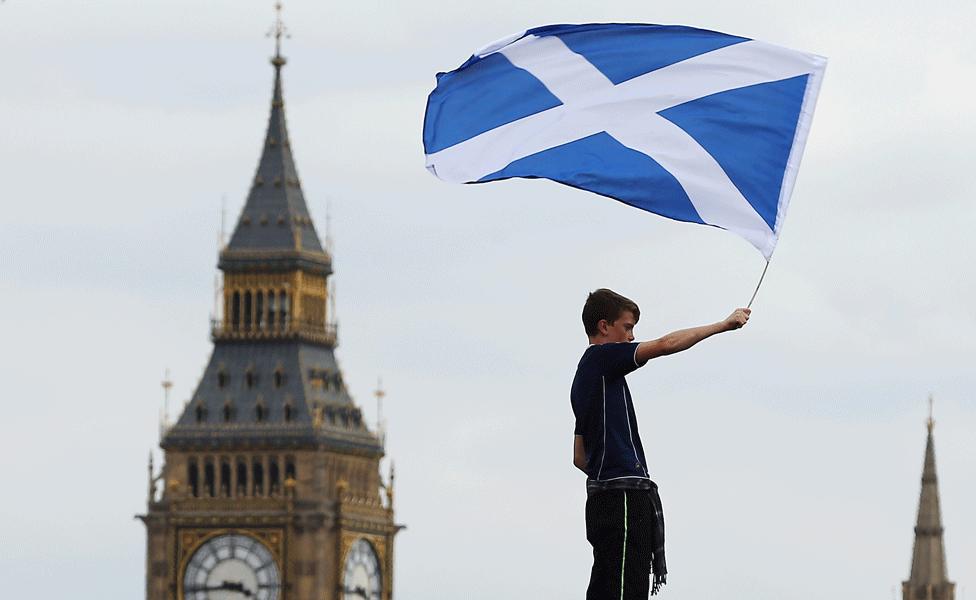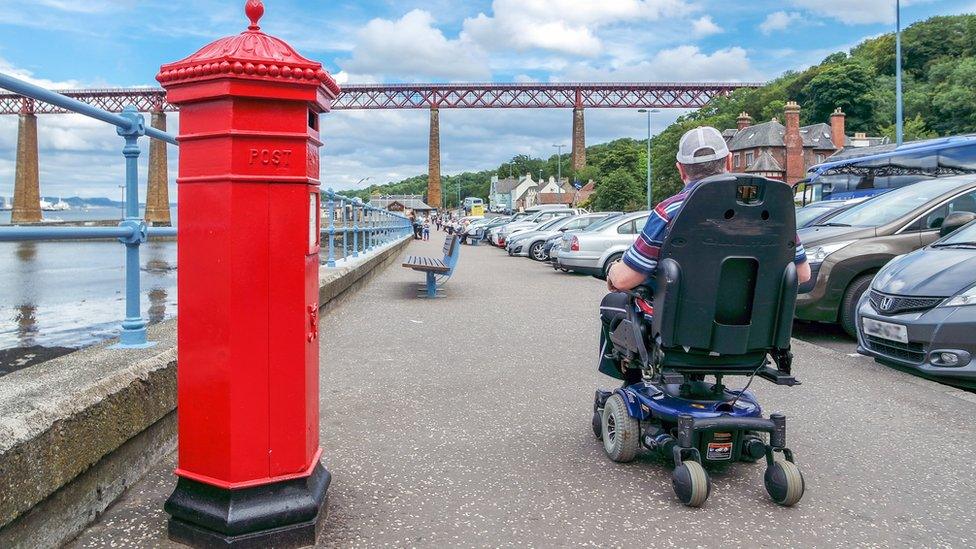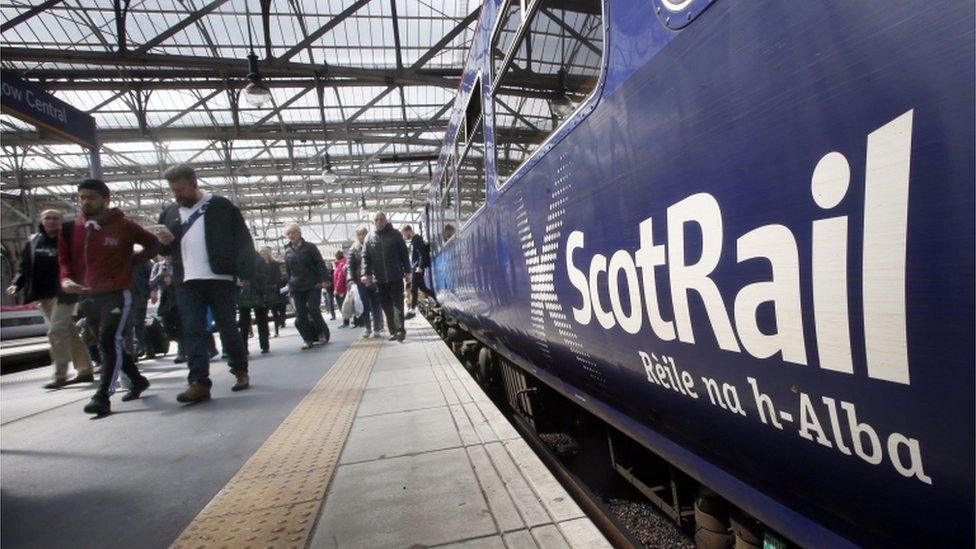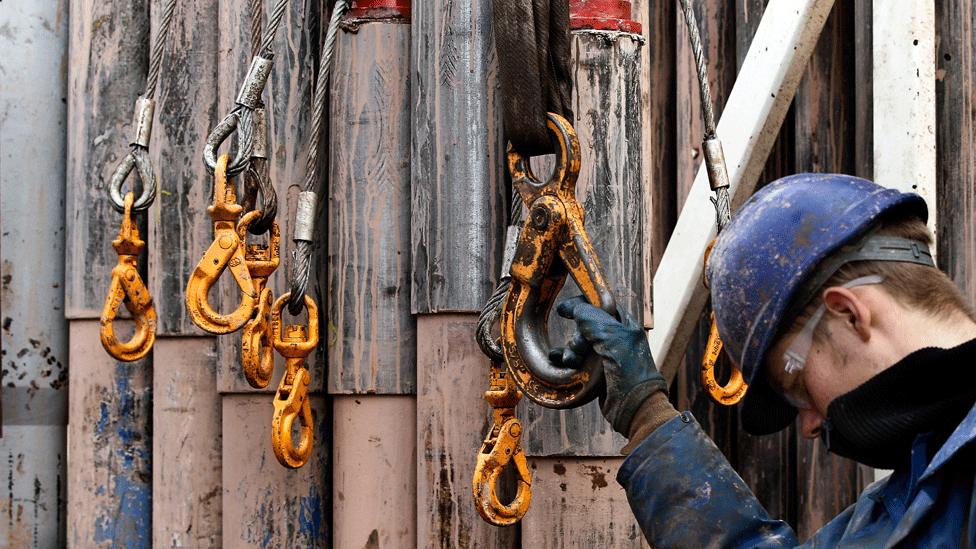Election 2017: Who has power over what in Scotland?
- Published

The Scottish Parliament's powers have grown significantly since it was set up in 1999. So, what do MSPs have control over, and what remains in the hands of MPs at Westminster?

Education, health, housing and immigration
Holyrood was set up with a broad set of powers, with areas from education to health being controlled in Edinburgh instead of London.
These powers have grown, in particular since the 2014 independence referendum which led to the Smith Commission and the Scotland Act 2016, external.
In turn, this has led to some confusion about what issues matter during elections - both to the Scottish Parliament and to Westminster.
Holyrood
The Scottish Parliament was established in 1999, with core powers over:
Education - everything from pre-school, primary, secondary, further, higher and lifelong education to training policy and programmes
Local government - including finance, legislative frameworks, policy and elections
Health and social work - including the NHS, funding, medicine, public and mental health and health education
Housing - including policy and building control
Justice - including policing, courts, civil and criminal law and procedure and licensing and property law
Agriculture, forestry and fisheries
Westminster
Meanwhile, the UK government retained powers over areas including:
Defence
Economic and monetary policy
The constitution
Employment
Foreign policy
Immigration
Trade and industry

Income tax, VAT and National Insurance

Holyrood's fiscal powers have grown significantly since 1999
When it was set up in 1999, Holyrood was given the power to vary income tax by 3p in the pound - but it it has never been used.
Nevertheless, the parliament's fiscal powers have expanded significantly since then.
It took on landfill tax and Stamp Duty from April 2015, replacing the latter with the Land and Buildings Transaction Tax (LBTT).
Holyrood also took on the power to set a Scottish Rate of Income Tax from April 2016. This gives MSPs control over 10p in the pound from the basic, higher and additional rates of income tax - although to date, they have chosen to stick with the rate charged in the rest of the UK.
The Scotland Act 2016 added significant new powers over tax. Under the existing setup, MSPs had the power to raise funds representing less than 10% of the money Holyrood spends each year. Once all the new provisions are in force that will rise to 36% - and if assigned revenue from VAT is added in 2019/20, it will be 48%.
This includes, from April 2017, the power to set rates and bands of income tax on non-savings and non-dividend income. In his first budget as finance secretary, Derek Mackay chose not to vary rates - but did set a different threshold for the higher 40p rate.
A borrowing limit first introduced in 2012 rose to £3bn for capital projects and £600m per year for resource spending, up to an overall limit of £1.75bn.
What the Scottish government won't be able to do is alter the rates of National Insurance and VAT, two of the big sources of public revenue.
Westminster has also retained the power to set the personal allowance for income tax, the point at which people start paying tax, as well as corporation tax - although there are plans to devolve the latter to Northern Ireland.

Carer's allowance, winter fuel payments and child benefit

The Scottish government is taking delivery of benefits including disability living allowances
Probably the most significant set of new powers devolved to Holyrood, outside tax, are on welfare and social security.
Work is currently under way to set up a Scottish Social Security Agency, which will oversee the delivery of benefits including;
Disability Living Allowance
Personal Independence Payments
Carer's Allowances
Discretionary Housing Payments
and Winter Fuel Payments
The handover of powers is being phased across the current parliamentary term.
Westminster will retain power over the majority of benefits, including the umbrella Universal Credit system - although Holyrood has some administrative control, which the government plans to use to increase the frequency of Universal Credit powers.
These powers are worth £15bn a year, external, to the £2.6bn spend on devolved benefits (on 2013/14 figures).
Payments staying at Westminster include;
Pensions
Child benefits
Jobseeker's allowance
Employment support allowance
Housing benefit
and tax credits
But Holyrood has the power to create new benefits, giving MSPs the ability to make different decisions to those taken at Westminster by "topping up" some payments.

Railways, speed limits and air taxes

Ministers have mooted the possibility of setting up a public sector train operator
Power over railways was transferred to Holyrood in 2005, external, and control over franchising followed in the 2016 Scotland Act. Transport Minister Humza Yousaf has since discussed the possibility of setting up a public sector train operator.
Railway policing has also been devolved, and the government is currently pursuing legislation to absorb the functions of the British Transport Police into Police Scotland.
Holyrood has also taken on legislative control over speed limits, road signs, drink-drive limits - which were lowered in 2014 - and parking.
Ministers are also taking control of Air Passenger Duty, which they aim to replace with an Air Departure Tax - with the aim of cutting the current levy by half, and eventually abolishing it altogether.
Westminster retains most powers over;
aviation
shipping
road traffic law
and driver licensing

Fracking, abortion and gambling machines

Onshore oil and gas extraction was devolved under the 2016 Scotland Act, and the Scottish government is consulting on whether to make an existing moratorium on "fracking" permanent, or whether it should allow the practice.
Holyrood has also taken on management of the Crown Estate and its assets in Scotland from April 2017, and now has regulatory bodies including the Office of Communications (Ofcom), the Office of Gas and Electricity (Ofgem) and the Northern Lighthouse Board report to it annually.
The 2016 Act gave MSPs legislative power over areas including;
abortion
consumer advocacy and advice
equal opportunities
and gambling machines
It also underlined the permanence of Holyrood, noting that the parliament and the Edinburgh government were "a permanent part of the United Kingdom's constitutional arrangements" which were "not to be abolished except on the basis of a decision of the people of Scotland voting in a referendum".
A full list of Holyrood's devolved powers can be found here, external.